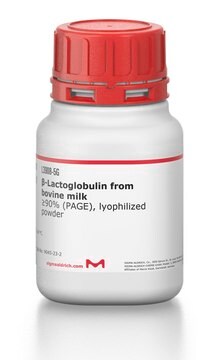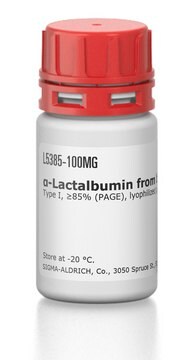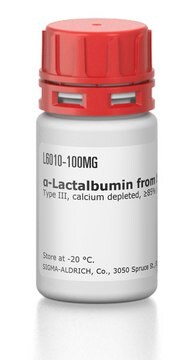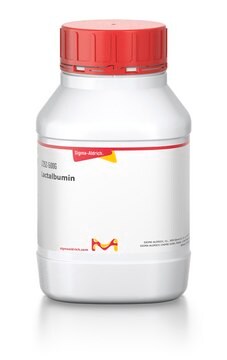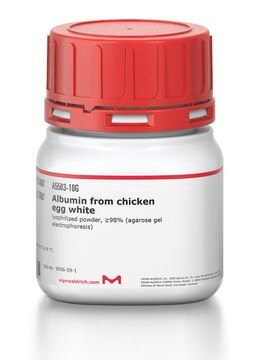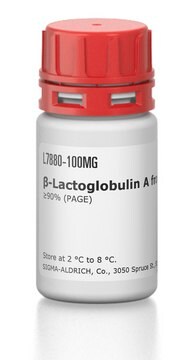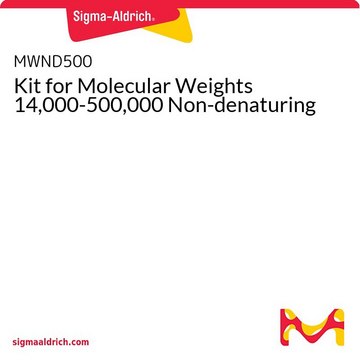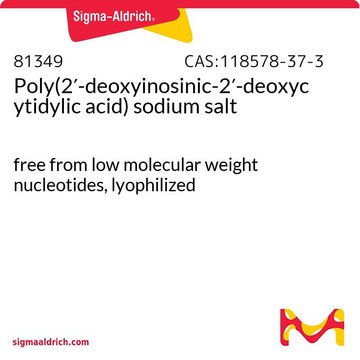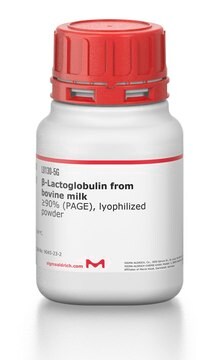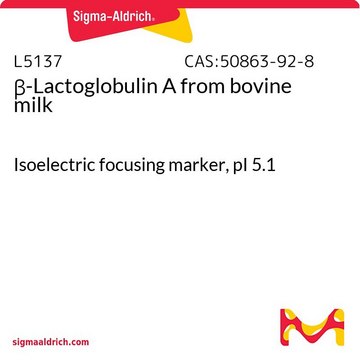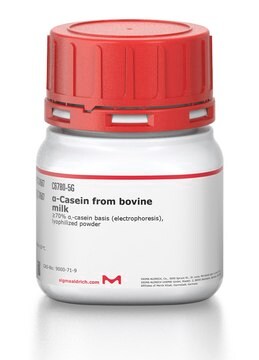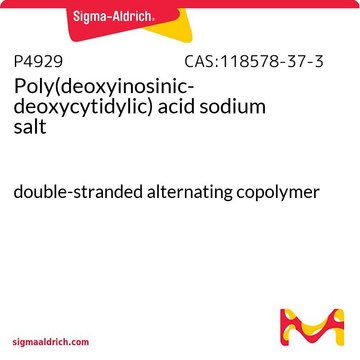L4385
α-Lactalbumin from bovine milk
Marker for non-denaturing PAGE
Autenticatiper visualizzare i prezzi riservati alla tua organizzazione & contrattuali
About This Item
Prodotti consigliati
Origine biologica
bovine milk
Livello qualitativo
Forma fisica
lyophilized powder
PM
~14.2 kDa
tecniche
microbiological culture: suitable
N° accesso UniProt
Temperatura di conservazione
−20°C
Informazioni sul gene
cow ... LALBA(281894)
Cerchi prodotti simili? Visita Guida al confronto tra prodotti
Descrizione generale
α-Lactalbumin is a small, globular, whey protein that has been found in all milk studied to date. It is a metalloprotein of approximately 14 kDa produced in the mammary glands.
Applicazioni
α-Lactalbumin was used in the isolation and analysis of restriction endonuclease digestive patterns of chromosomal DNA from Mycobacterium paratuberculosis and other Mycobacterium species. It was also used in a study to test if the neuroendocrine protein 7B2 suppresses the aggregation of neurodegenerative disease-related proteins.
Azioni biochim/fisiol
α-Lactalbumin is the cheif protein in human milk. It consists of a single polypeptide chain with 8 cysteines which form disulfide bridges. α-Lactalbumin binds several metal ions, including calcium, which is thought to play a role in the regeneration of native α-lactalbumin from the reduced, denatured form. α-Lactalbumin also has a distinct zinc binding site that is thought to play a role in the binding of the lactose synthase complex. The mature protein consists of 123 amino acid residues (14 kD), and it has a three-dimensional structure with 1.7 Α° resolution, demonstrating four α-helices and a triple stranded antiparallel β-sheet.
Alters the substrate specificity of galactosyltransferase to increase the rate of lactose formation; the complex of galactosyltransferase and α-lactalbumin is called lactose synthase. Site-directed mutagenesis of Asp87 or Asp88 to Ala completely abolishes the strong calcium binding affinity and reduces the stimulation of lactose synthase to <3.5% of the maximal rate.
Ricostituzione
0.9-1.4 mg/mL after reconstitution with 1 mL of water
Codice della classe di stoccaggio
11 - Combustible Solids
Classe di pericolosità dell'acqua (WGK)
WGK 3
Punto d’infiammabilità (°F)
Not applicable
Punto d’infiammabilità (°C)
Not applicable
Certificati d'analisi (COA)
Cerca il Certificati d'analisi (COA) digitando il numero di lotto/batch corrispondente. I numeri di lotto o di batch sono stampati sull'etichetta dei prodotti dopo la parola ‘Lotto’ o ‘Batch’.
Possiedi già questo prodotto?
I documenti relativi ai prodotti acquistati recentemente sono disponibili nell’Archivio dei documenti.
I clienti hanno visto anche
Michael Helwig et al.
The Journal of biological chemistry, 288(2), 1114-1124 (2012-11-23)
Neurodegenerative diseases such as Alzheimer (AD) and Parkinson (PD) are characterized by abnormal aggregation of misfolded β-sheet-rich proteins, including amyloid-β (Aβ)-derived peptides and tau in AD and α-synuclein in PD. Correct folding and assembly of these proteins are controlled by
Comparison of the amino acid sequence of bovine alpha-lactalbumin and hens egg white lysozyme.
K Brew et al.
The Journal of biological chemistry, 242(16), 3747-3749 (1967-08-25)
D L Whipple et al.
Journal of clinical microbiology, 25(8), 1511-1515 (1987-08-01)
A relatively rapid and efficient method for the extraction of chromosomal DNA from Mycobacterium paratuberculosis and other mycobacteria was developed. Approximately 25 to 50 micrograms of DNA could be extracted from 100 mg (wet weight) of cells, which was sufficient
J Ren et al.
The Journal of biological chemistry, 268(26), 19292-19298 (1993-09-15)
It has been proposed that the binding of Zn2+ to alpha-lactalbumin switches the conformation to one akin to a state intermediate in the folding of the protein. However, the high resolution x-ray crystal structure of human alpha-lactalbumin-Zn2+ complex at 1.7-A
D B Veprintsev et al.
FEBS letters, 412(3), 625-628 (1997-08-04)
The thermal denaturation of bovine and human apo-alpha-lactalbumins at neutral pH has been studied by intrinsic protein fluorescence, circular dichroism (CD), and differential scanning microcalorimetry (DSC) methods. Apo-alpha-lactalbumin possesses a thermal transition with a midpoint about 25-30 degrees C under
Il team dei nostri ricercatori vanta grande esperienza in tutte le aree della ricerca quali Life Science, scienza dei materiali, sintesi chimica, cromatografia, discipline analitiche, ecc..
Contatta l'Assistenza Tecnica.